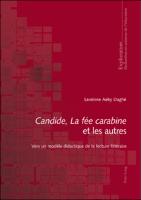«Candide», «La fée carabine» et les autres
Vers un modèle didactique de la lecture littéraire
Abstract
Les pratiques de lecture des élèves ont fait l’objet de recherches de grande ampleur. Mais que sait-on des pratiques d’enseignement ? Qu’est-ce qui se construit lorsque des enseignants et des élèves abordent un texte en classe ? Cet objet varie-t-il en fonction des textes ? De leur longueur ? De leur statut ? L’auteur a mené une recherche avec des enseignants qui ont étudié Candide de Voltaire et La fée Carabine de Pennac avec leurs élèves de 16 ans. Comment les enseignants s’y sont-ils pris dans cette entreprise complexe? Comment ont-ils assuré les liens entre les lectures réalisées à la maison et le travail en classe ? Certes, chaque enseignant s’y prend différemment. Mais un phénomène commun apparait: le recours à des genres d’activité scolaire pour appréhender différentes facettes des textes littéraires et assurer les liens entre le commentaire de texte et les lectures des élèves. Le chercheur trouvera dans cet ouvrage une démarche d’analyse systématique des interactions didactiques. L’enseignant y découvrira des modèles d’activités qui lui permettront de mieux comprendre ses pratiques et l’inspireront dans la conception d’activités futures.
Keywords
Primary and middle schools; Teaching skills and techniques; Teaching of a specific subject; Literature: history and criticism; Literary theoryDOI
10.3726/978-3-0352-0258-8Publisher website
https://www.peterlang.com/Publication date and place
Bern, 2014Series
Exploration, 163Classification
Teacher training
Literary studies: c 1800 to c 1900
Teaching skills and techniques
Study and learning skills: general


 Download
Download